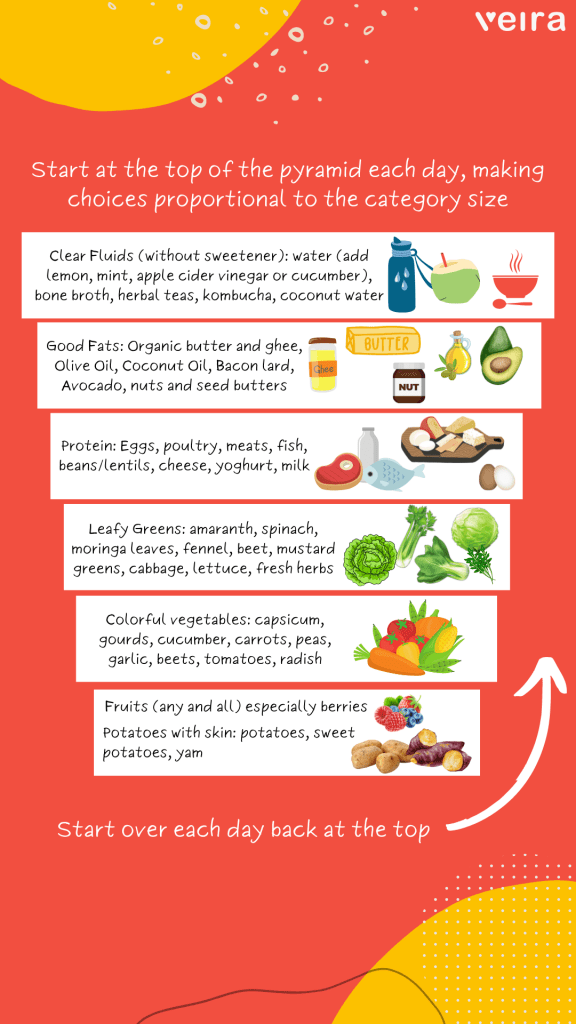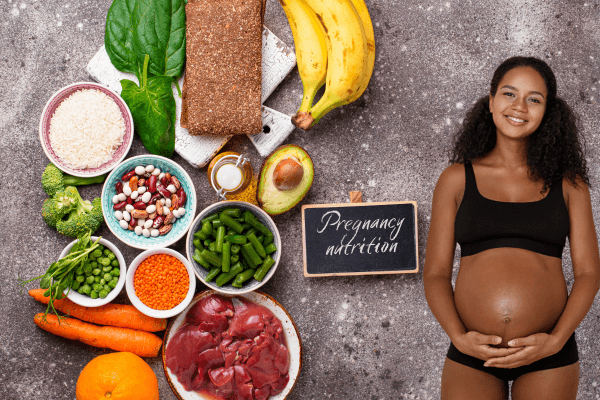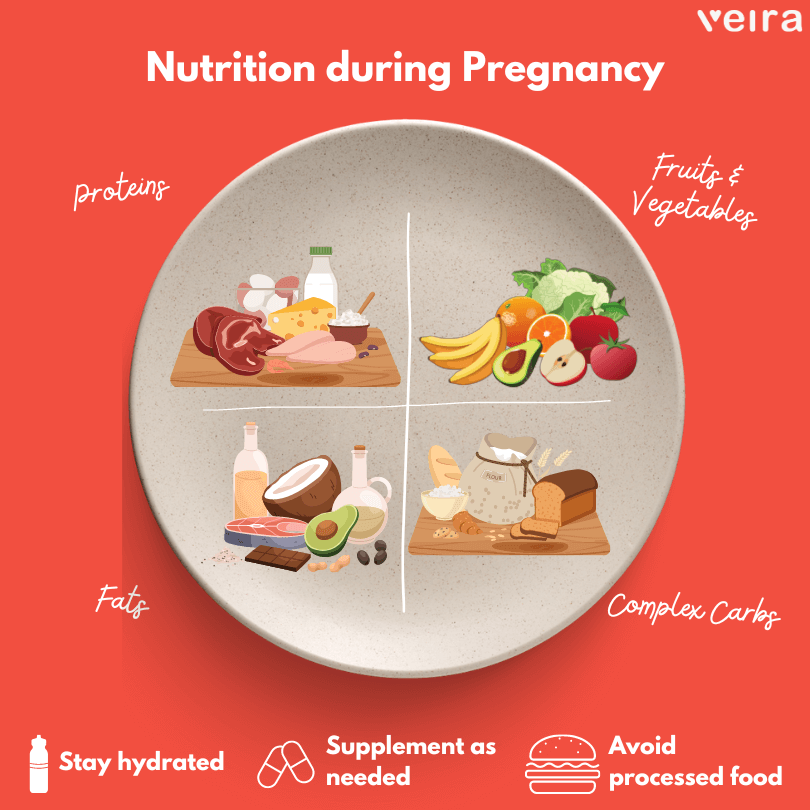Good nutrition is paramount during pregnancy. A well-balanced diet means that all the myriad energy and nutrient needs of your body and your baby are met. Like they say. “You are what you eat and so is your baby!”
The energy needs in pregnancy go up significantly. That doesn’t necessarily mean that you need to eat a lot more or eat double the amount, or as they say-” eat for two” – eating smart is the key. We are conditioned to look outwards but listening to your body and following the cues will be more beneficial. Looking inwards, and tuning into how we feel when we eat certain foods can be the clue to optimal pregnancy nutrition.
Consequences of inadequate maternal nutrition during pregnancy
Before we figure out what a well-balanced pregnancy diet is, let us briefly look at what are some possible consequences of inadequate maternal nutrition on the developing baby according to research-
- Preventing malnutrition and hunger in pregnant persons ensures that the children are at a lower risk for obesity
- Lack of nutrients is linked to birth defects and mental capacity of the baby
- The best way to prevent deficiencies for the baby in the early weeks of pregnancy is to ensure good nutrition and if you can, start this process even before the pregnancy
- Not having enough salt and proteins in the diet can lead to pregnancy complications for the mother like high blood pressure, pre-eclampsia, and other related conditions.
- Pica is a pregnancy condition in which one feels like eating nonfood like chalk, paint, and mud. This usually points to nutritional deficiencies.
- Some mothers can develop high blood sugar in pregnancy which is often linked to poor diet.
- Inadequate nutrition impacts the post-birth recovery of the mother.
Benefits of good maternal nutrition during pregnancy
On the other hand, how does good food influence pregnancy, birth, and recovery for the mother and the health of the baby?
- Eating a lot of vegetables increases the chances of a healthy-sized baby by 4-5 fold
- Babies have enough resources to deal with the stress of labor and birth
- Babies are born with good birth weight, they are well-developed, adjust better to being on earth, nurse better, and sleep better.
- They are born with 6 months reserves of iron in their liver.
- Smoother labor and birth for the mother
- Better and easier postpartum recovery
- Mother has enough resources so that even if she loses more blood than normal immediately after birth, she can recover more easily.
- Mothers with good nutrition throughout their lives usually have healthier tissues and lesser vaginal/perineal tears.
Tips for optimal nutrition during pregnancy
Now that we have established the impact of food in pregnancy, what should you be eating?
At every meal time imagine a plate divided into four parts:
– one part proteins,
– second part fats,
– third part micronutrients, fiber- fruits and vegetables, and
– fourth part complex carbohydrates
This division will ensure you are getting a balance between all the nutrients you need.
You can also add to this: honey and dates, sprouted and pre-soaked whole grains, and sea salts, especially local
Another way of looking at it is to follow this pyramid. Start at the top of the pyramid each day, making choices proportional to the category size, and start over each day back at the top.

Some cool facts about maternal nutrition during pregnancy
- A pregnant person needs 80-100 gms of proteins per day.
- Salts with trace minerals are essential to increase blood volume in the second trimester, please do not deprive yourself of salt in your food unless advised otherwise by your doctor.
- Iron-rich foods ensure that you have enough blood in your body to nourish your baby and for postpartum recovery.
- Adding collagen can help with perineal and overall health.
- Vitamin C can help with the strength of the amniotic sac and for smoother labor.
- Have 6-8 dates in the third trimester for a smooth labor
Keep track of your nutrition during pregnancy
Prenatal supplements
While all vitamins and minerals are important for overall health and well-being, the focus on core nutrients takes a whole new meaning in pregnancy. We are talking about Iron, Vitamin D3, Vitamin B12, and their co-factors: Vitamin C, Magnesium, and Vitamin K2. Co-factors help in better absorption and assimilation of nutrients.
Blind supplementation can be detrimental and if you are getting enough nutrition and sunlight (in the case of Vitamin D3) then you are good. But pregnancy is one of those unique situations where your needs increase multifold. Iron is essential as the blood volume doubles in pregnancy. Vitamin D3 is essential for hormonal production and childbirth is driven by hormones. Vitamin B12 is essential for neurological development in the baby. Vitamin C is known to increase immunity in the mother, making for a smoother labor and birth. Blood tests can be ordered by your care provider to determine your levels and supplementation requirements. You can also get your Veira Coach to counsel you on bioavailable supplements, dosage, and the optimal time to take them.
Food or beverages to avoid during pregnancy?
- Avoid processed foods as
1. They are empty calories and do not have nutrients
2. Contain toxins
3. High in sugars and seed oils - Avoid too much coffee. It is a stimulant
- Seafood high in mercury is a known toxin
- Smoking, alcohol, and drugs can cause birth defects
- Aspartame should be avoided as it can be toxic
- Mineral oil as it blocks the absorption of fat-soluble vitamins
Why is it important for a pregnant woman to drink water?
As you may already know, our bodies thrive and survive on water. There are many advantages to being hydrated.
- Helps prevent constipation in pregnancy
- Helps with digestion
- Helps prevent water retention and edema
- Prevents urinary tract infections
- Ensures enough amniotic fluid is made for the baby
- Flushes out toxins
- Helps with blood volume expansion and reduces edema in the third trimester.
Make sure you take breaks throughout your day and have a drink. Coconut water if available is a real way to replenish your electrolytes while hydrating. If you need a change, consider flavoring your water with lemon juice and salt. You can get creative and also add mint, cucumber, watermelon, etc. to your water.
Conclusion
How can Veira Life Support You?
At Veira Life, we are committed to helping you get the best start possible in your parenthood journey and staying with you every step of the way. Every user on the platform is paired with their dedicated Veira Coach. Veira Coaches are certified doulas, midwives, childbirth educators or lactation counsellors with years of experience supporting pregnant and new parents through their transition into parenthood. The coaches are available to answer any questions you have, ease your anxieties, even help preempt the challenges coming your way and support you in a holistic and compassionate manner. Register to try it out for yourself.

Author Bio
Chetana is a skilled and passionate Childbirth Educator trained in the Lamaze philosophy of childbirth preparation. She is also a Lactation Educator-Counselor and practicing midwife. She has developed a holistic childbirth preparation course which she has delivered to hundreds of families and has founded a highly rated natural birth center in Bangalore, India. She has over 11 years of experience supporting families through their journey and transition into parenthood.








